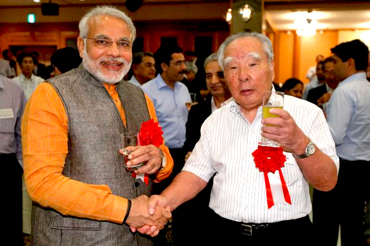Tokyo, Aug 30: Japan and India both have much to gain from a visit by Prime Minister Narendra Modi and more than a dozen Indian steel, energy and IT tycoons that begins on Saturday in the ancient capital of Kyoto.
 The two countries have complementary economies, given Japan's wealth and technological prowess and India's natural resources and drive to modernize its economy.
The two countries have complementary economies, given Japan's wealth and technological prowess and India's natural resources and drive to modernize its economy.
So far, though, they have failed to capitalize much on those mutual interests. The two countries signed an economic cooperation agreement in 2011 that is gradually dismantling tariffs, but trade between the two despite gains remains a tiny fraction of their overall import and export flows.
That's partly because of India's restrictive policies toward foreign investment and partly because Japanese companies have been so focused on China.
Analysts expect Modi's visit with Prime Minister Shinzo Abe to yield some substantial agreements, and possibly a long-awaited deal on cooperation in nuclear power generation technology.
But in the long run, Modi must deliver on promises to improve his country's investment environment while balancing India's growing engagement with both Japan and rival China.
"I think there'll be some very big agreements, on the energy side also, not just nuclear but also renewable energy.
India has been lagging on that and needs help from Japan," said Rajiv Biswas, Asia-Pacific economist at IHS Economics.
In the run-up to their meeting, Abe and Modi have been exchanging endearments on Twitter.
"I deeply respect his leadership & enjoy a warm relationship with him from previous meetings," Modi wrote of Abe, adding that he hoped to take to take the relationship "to a new level."
"India has a special place in my heart. I am eagerly waiting for your arrival in Kyoto this weekend," tweeted back Abe, who is taking the unusually cordial step of traveling to Kyoto to escort Modi and his delegation before they fly to Tokyo late on Sunday.
Since taking office in late 2012, Abe has been trotting the globe to help clinch big contracts for Japanese industrial giants like Hitachi and Mitsubishi Heavy Industries, as part of his "Abenomics" agenda to help restore the country's economic dynamism.
India, which plans to spend USD 1 trillion on roads, railways and other infrastructure in 2012-2017, is a VIP customer.
And Modi will be trying to woo Japanese investment in three of his favorite projects, including railway modernisation, an industrial corridor between New Delhi and Mumbai, and a plan to build 100 "smart cities" with high-tech communication facilities and modern infrastructure.
"Who is a better expert in bullet train technology than Japan?" said Kunal Singh, a researcher at the Center for Policy Research, a New Delhi think tank.
The financial newspaper Nikkei reported on Thursday that the two sides may also expand cooperation on India's mining of rare earths, as Tokyo diversifies away from a longstanding reliance on China for the minerals used in many high-tech applications.





Comments
Add new comment